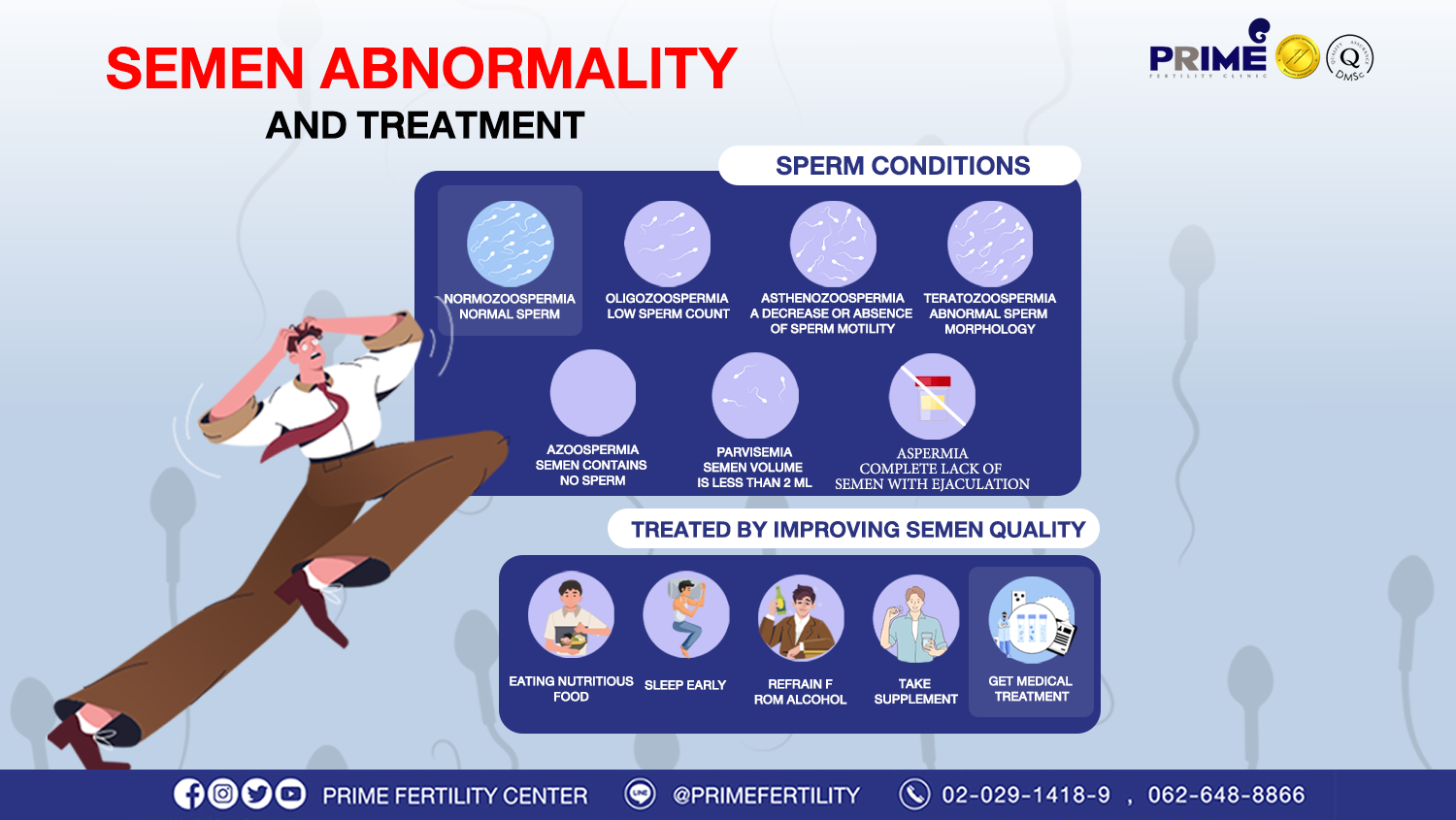Infertility refers to when a couple cannot conceive despite having at least one year of regular unprotected sex. It can be caused by both male and female sides.
Male Infertility is defined as the inability of a male to make a female pregnant. 40% of infertility are caused by male issues. Most of the issues are related to semen abnormality, which is about 85% of male issues. An important organ affecting male fertility is the testicles. They produce male sex hormones and male gamete, sperm. The function of the testicles is controlled by the pituitary gland as well as the female’s ovaries.
These are sperm conditions:
- Normozoospermia: Normal sperm analysis results
- Oligozoospermia: A low sperm count
- Asthenozoospermia: A decrease or absence of sperm motility
- Teratozoospermia: Abnormal sperm morphology
- Azoospermia: Semen contains no sperm
- Parvisemia: The semen volume is less than 2 ml.
- Aspermia: The complete lack of semen with ejaculation
The major cause of semen abnormality remains unclear. It could be caused by testicles abnormality, reproductive system infections, or daily lifestyles such as stress, being overweight, heavy workouts, or sexual issues like erectile dysfunction and premature ejaculation. Alcoholic beverages, cigarettes, drugs, or some kinds of antibiotics also affect semen quality.
Semen abnormality can be treated by improving semen quality by eating nutritious food, focusing on good protein such as fish and nuts, and focusing on food rich in antioxidants. Other treatments are regular and moderate exercise without overdoing it and a quality sleep pattern by not staying up late (before 10:00 p.m.) for at least 7-8 hours. Also refraining from drinking alcohol, smoking, and drug use will help improve sperm quality.
If the treatments mentioned do not work, it is recommended to use assisted reproductive technology such as
- IVF/ICSI
- PESA, TESE, MESA: a surgical sperm retrieval used in fertility treatment for men who have no sperm in their ejaculate. A selected sperm will be fertilized with an egg by ICSI procedure.
Reference: Prime Fertility Center Co., Ltd.
If you’re interested in our ICSI program, kindly find more details as below website: https://www.primefertilitycenter.com/en/package-promotion-2/icsi-package/
—————————————————————–
ICSI (Intracytoplasmic Sperm Injection)
ICSI (Intracytoplasmic Sperm Injection) is an in vitro fertilization procedure with the laboratory technology. Both IVF and ICSI are comprising of similar procedures. But the difference is how sperm will fertilize an egg. In ICSI program, only one best sperm cell will be selected then injected directly into a fully matured egg. Patients will be prescribed some hormonal medications. Stimulating ovaries to produce several eggs. ICSI can make a pleasant fertilization rate. As well as reduces some fertilization problems or abnormalities caused from egg and sperm. For examples: multiple sperm fertilize an egg, sperm cannot penetrate the egg. The combined egg will transform to be an embryo after fertilization. Next, the embryo will be raised and will grow up among the appropriate environment inside a laboratory. Finally, the embryo will be transferred to the uterine cavity in order to implant then develop to be the fetus later on.
Couples who should receive the infertility treatment with ICSI program:
- Female’s age more than 35 years
- Stenosis for both sides of the fallopian tube
- Severe Endometriosis
- Ovarian hormone dysfunction for examples: Chronic Anovulation, PCOS (Polycystic Ovary Syndrome)
- Severe sperm abnormalities including sperm morphology, sperm count, sperm motility
- Male who is sterile or had a vasectomy but the body can still produce sperm. To extract sperm under this limitation, a surgical procedure will be performed such as PESA, TESA, TESE.
- Couples who have failed from previous IVF cycle
- Couples who prefer to screen the embryo’s genetic diseases
Frozen Embryo Transfer (FET)
Frozen Embryo Transfer (FET) is the process of embryo transplantation into the uterus after thawing frozen embryo. The patient can choose the FET date by convenient time e.g., 1-2 months after the fertilization process. The evidence supports FET in women more than 35 years of age are providing more pregnancy rates than FRESH embryo transfer.
Due to the inducing medication that the female takes to develop multiple of healthy ovum, the huge amount of hormones generated will weaken endometrium, consequently lessening the success rate of the transfer regardless of the perfect condition of embryos. Given the circumstance, the embryo transfer right away after ovum retrieval (FRESH transfer) may not be an effective protocol.
Moreover, a number of studies from various institutes found that FET offers better and higher chance of pregnancy than the FRESH transfer because endometrial tissue is in more proper state for embryos. Therefore, the doctor will consider which protocol fits best for each couple individually.

